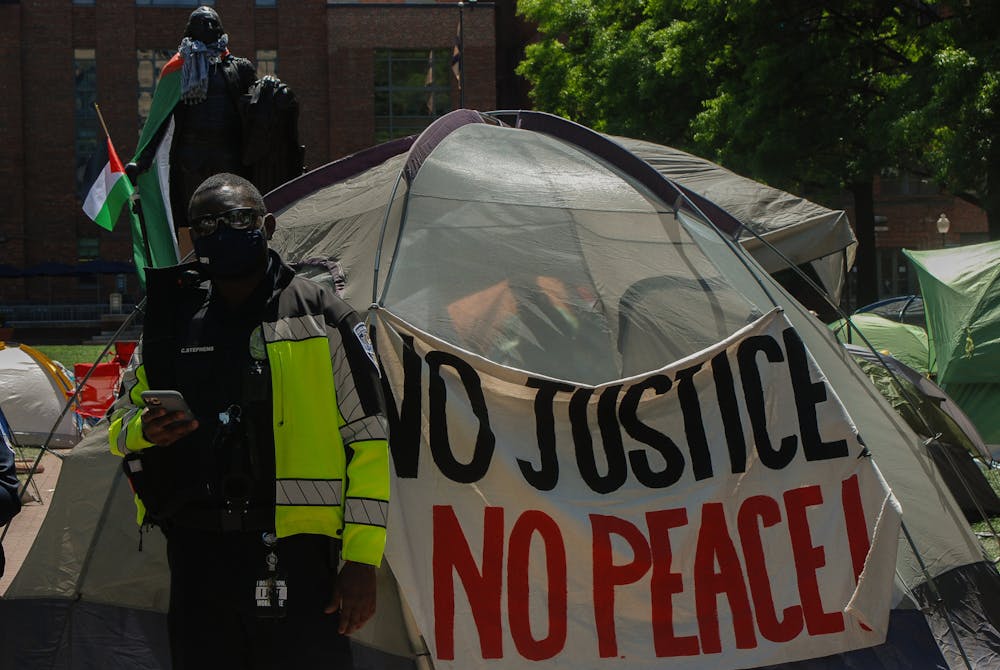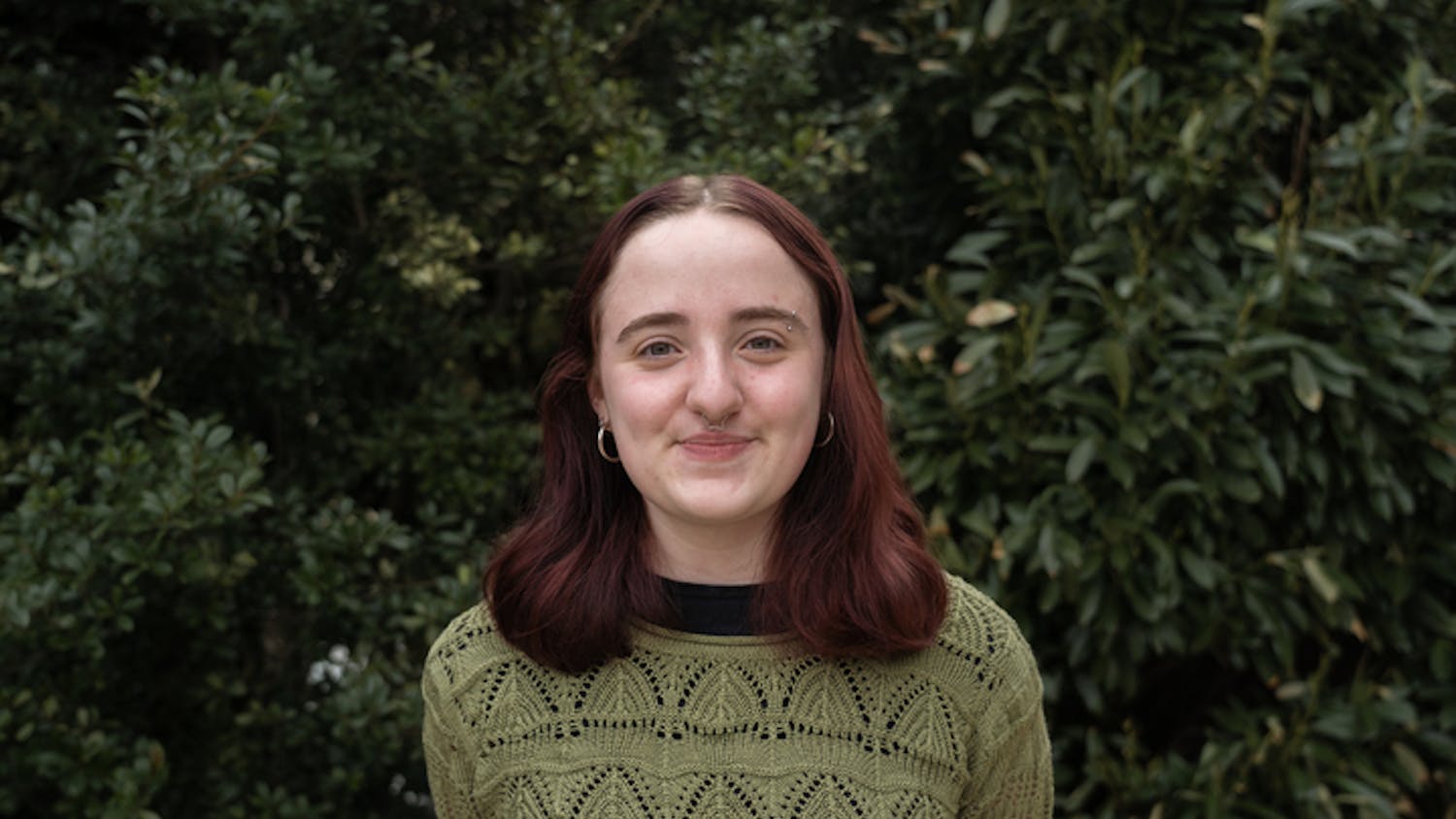Editor’s note: This is reporting as of 11 p.m. April 26. The Eagle will monitor the situation through the night and continue to update coverage.
Organizers at the George Washington University encampment announced after 8 p.m. Friday that seven students have been placed on interim suspension as the encampment entered its 42nd hour on University Yard. Each faces nine counts of misconduct and will lose university housing. Crowds chanted “shame” and “shut it down” as they listened to the announcement.
The encampment was barricaded by fencing early this morning to bar any outsiders — GW students or not — from entering University Yard. It has been 28 hours since GW’s original deadline to clear. Metal fences surround University Yard, making it impossible for anyone to enter.
The Washington Post reported Metropolitan Police denied GW’s request to clear the encampment early Friday morning, as “they worried about the optics.” Since then, GW Police have monitored entrances to the site and MPD blocked access to the road, with vehicles at both ends, around 1 p.m.
While the crowd outside the encampment shrank the night before, organizers regrouped in the morning, building the crowd into the hundreds throughout the day. Demonstrators kept the protest engaged and vocal with chants such as, “This campus is a freedom zone,” “Stand up, fight back” and “Resolution, revolution.” The crowds fluctuated over the course of the day, but remained in the hundreds.
Not everyone present at the encampment was involved with its planning nor did everyone spend the night. Some individuals came to University Yard to show their support.
GW’s chapter of Students for Justice in Palestine sent out a list of five demands at 4:04 p.m. via Telegram which calls for “charges” against pro-Palestine organizers to be dropped, protections for pro-Palestine speech on campus, the divestment from companies interacting with Israel, disclosure of which companies and investments GW funds and to end partnerships with Israel.
Social media posts throughout the day from the DMV Palestinian Youth Movement and DMV SJP called for more supporters to show up and contact university administrations about the demands. Over the course of the day students poured in from multiple universities across the DMV, including American University.
The university is only allowing GW students to use the bathroom indoors, but there is a small bathroom tent outside with buckets for the non-GW students in the camp.
As the crowd swelled, a small number of students stood holding large Israeli flags across the street, but there were few engagements with the encampment.
For the people inside the encampment, conditions are “pretty good” according to Moataz Salim, a doctoral student at GW studying clinical psychology and an AU graduate school alumni. Salim said that he has lost over 100 family members in Gaza and has been with the encampment since its start at 5 a.m. Thursday.
Salim further explained the importance of the protest, while mentioning how the events within Gaza have affected education.
“As part of it being a student movement, we also remind people that every higher ed institution in Gaza is decimated. There’s not a single university left, they’ve killed or injured over 5,000 students and faculty in Gaza. Enough is enough,” Salim said.
Salim went on to say that the people within the encampment with him are “extremely brave, some of the bravest people I’ve ever met.”
Outside the encampment, protesters came from many different backgrounds to show support, such as Grace Kurland, who brought her two young children to see the protest.
“I’m super excited that the student actions have finally made it to D.C. from New York,” she said. “I want to be here around people who share my values as much as possible because it’s hard being surrounded by people who are just fine with genocide. And also I think it’s really important for my kids to see that this is normal and this is what they should be aspiring to be like.”
Mike Golash, an 81-year-old protester who formally studied at Columbia University and was a Vietnam War protester, has been to the encampment both days. They told the crowd about their involvement with organizing over the years.
“I’m not quite able or energetic as some of these young students are, but I’m doing the best I can,” Golash said.
They additionally compared the Vietnam protesting and current pro-Palestine protesting as “both movements were predominantly based among students.” They said students should reach out to more members of the working class to build support.
Will Youmans, an associate professor in GW’s School of Media and Public Affairs, spoke to the crowd to express solidarity as a faculty member with the students in the encampment.
“I believe the students need the support of the faculty to feel like the university is not totally against them,” Youmans said. “We have to show up for them and not make them feel isolated.”
Youmans said that he thinks this student advocacy will follow the same pattern as the Vietnam War in that it will be condemned until society “slowly catches up.” In 1968, protesters at Columbia University took over university buildings due to discontent about the Vietnam War.
“The students are the conscience of the country right now,” Youmans said. “To me it’s all failing to stop the genocide, and this is a failure that exposes the superficiality of our moral commitments, but once again the students are on the right side of history. And unfortunately that usually only gets acknowledged after the fact.”
AU’s chapter of SJP joined students at GW to call for DMV universities to divest from Israel, writing in a statement to The Eagle that they “joined the DMV SJP coalition to fight for Palestinian liberation and join students all across Turtle Island who are starting encampments to reclaim their campuses.”
“We stand in solidarity with students at GW who have faced extreme repression by their administration, and we also call on American University to meet these demands as well,” the statement continued.
Several AU students, faculty and alumni were in attendance as organizers gave space for people to play music, read poetry and share experiences.
“This is a peaceful protest. This is at a time when we have so much injustice and oppression taking place halfway across the world,” said Kaden Ouimet, a freshman in the School of Public Affairs and an SG senator-at-large. “It’s a shame to see disciplinary punishments for nonviolently protesting in a cause they deeply believe in.”
“I think it’s kind of crazy that [AU] put[s] so much stock in us being changemakers and when the students rally and the students make their voices heard, they just immediately shut them down,” Nora Dudley, a sophomore in the SPA, said.
Dudley said she had been involved with several SJP protests at AU and was present when Student Government passed the resolution calling for AU to divest from Israel on April 19. She said she wanted to show that the police action against protesters across the country is not justified, “by my existence as a Jewish student on campus.”
“I think that our liberation is inherently connected … This is important to me morally and it’s important for me to come out here as a Jewish student and say like you know, people say ‘Not in my name,’” Dudley said.
Emma Briggs, an AU junior in the College of Arts and Sciences and School of Communication, echoed Dudley’s sentiments.
“As a Jewish person, it’s important to know that Judaism and Zionism are not synonymous. And they’re two very different things and that Jewish people aren’t Zionists,” Briggs said. “We are the victims of ethnic cleansing ourselves, so why are we subjecting other people to that? It’s so backwards.”
As the demonstration continued through the afternoon, speakers shared why they came to University Yard. Some were students who want their universities to cut ties to Israel while others shared stories about personal and familial ties to Palestine.
Throughout these speeches, Skyler Sieradzky, a senior at GW studying political science and philosophy, stood on the steps across the way holding an Israeli flag.
“I think that it’s important to show solidarity with my people and with the hostages that are still currently in Gaza,” she said. “I just want people to know that we, the Zionist body at GW, is still alive, and we will stand with our people when we won’t be intimidated.”
Lillian Frame, an AU alum and community organizer, was in attendance on both Thursday and Friday and spoke with The Eagle about student organizing.
“Pride is probably the most that I feel with regards to these students and the way that they’re organizing. Just super proud of them, and all the AU students who are out here and all the GW and Georgetown and every other school around us,” Frame said.
Luna Jinks, Sophie Milner-Gorvine, Olivia Wood, Lydia LoPiccolo, Izzy Fantini, Gabrielle McNamee and Owen Auston-Babcock contributed reporting.
This article was edited by Walker Whalen, Abigail Hatting, Zoe Bell, Tyler Davis and Abigail Turner. Copy editing done by Luna Jinks and Sarah Clayton.





